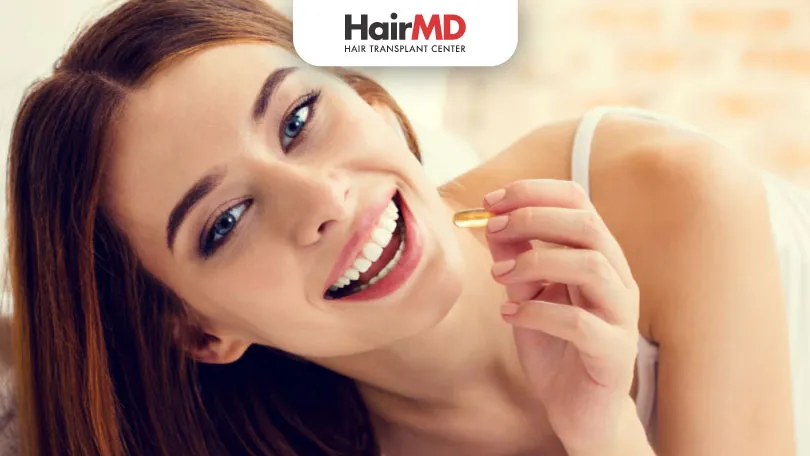12th March, 2025

What’s covered in the article?
- Why is Omega-3 Essential for Hair Health?
- What Are The Benefits Of Omega-3 For Hair?
- How do you use fish oil for hair growth?
- Possible Side Effects of Omega-3 for Hair
- FAQs
- Conclusion
Why is Omega-3 Essential for Hair Health?
Omega-3 fatty acids are super important for overall health, and recent research shows they can do wonders for hair growth and thickness too. Fish oil, packed with these fatty acids, delivers essential nutrients that nourish hair follicles and strengthen strands. It also boosts blood flow to the scalp, helping hair grow better and healthier. If you’re looking to keep your hair in great shape, fish oil might just be the secret ingredient!
What Are The Benefits Of Omega-3 For Hair?
The benefits of omega-3 for hair are numerous. These fatty acids not only nourish hair but also provide vital nutrients required for robust growth and increased thickness. Additionally, omega-3s exhibit anti-inflammatory properties, countering factors that contribute to hair loss. The proteins and nutrients found in fish oil benefits hair supporting hair follicles, creating an environment conducive to healthy hair growth. Moreover, omega-3s can enhance hair shine, prevent dryness, and combat issues like flaking.
How do you use fish oil for hair growth?
If you’re wondering how to use omega-3 for hair growth, then adding the fish oil into your diet or taking supplements are effective methods. Fatty fish, nuts, and soybeans are excellent dietary sources of omega-3 fatty acids.
Alternatively, fish oil supplements can be considered, offering a convenient way to boost your omega-3 intake. However, it’s crucial to consult with a dermatologist before making any dietary changes or taking supplements to ensure they align with your individual health needs.
Possible Side Effects of Omega-3 for Hair
While omega 3 benefits for hair are many, it’s essential to be aware of potential side effects, primarily associated with fish oil supplements. Unpleasant side effects may include bad breath, a fishy aftertaste, nausea, and diarrhea. You should note that high doses of fish oil could also impact blood clotting, posing risks for individuals with bleeding disorders or those on anticlotting medications. Consulting with a healthcare professional before incorporating omega-3 supplements is advisable to mitigate these risks.
FAQs
- Are Omega-3 Supplements Safe for Everyone?
Definitely. However, if you want to know if it’s safe everyone then it’s essential to consult with a healthcare professional before taking omega-3 supplements, especially for individuals with existing health conditions.
- How Soon Can I Expect Results from Using Omega 3 for Hair Growth?
Results may vary, but consistent use of omega 3 supplements or dietary sources can lead to noticeable improvements in hair health over time.
- Are There Any Side Effects of Using Omega 3 for Hair?
Possible side effects include bad breath, a fishy aftertaste, nausea, and diarrhea, especially with fish oil supplements.
- Can Omega-3 Improve Hair Texture?
Yes, omega-3 fatty acids contribute to improved hair texture by providing essential nutrients and promoting overall hair health.
- Who cannot take omega-3?
Individuals with bleeding disorders or those taking anticlotting medicines should avoid high doses of omega-3 supplements, and consultation with a hair care professional is recommended.
Do You Know?
Nearly 250 Patients Visit HairMD
Everyday For Various Hair Concerns?
(Your journey to healthier and fuller hair starts here!)
Meet Our Dermatologists
Conclusion
Further Reading
Top Kitchen Ingredients to Boost Hair Growth
Discover the best kitchen ingredients for hair growth! Use coconut oil, onion juice, aloe vera & more to nourish your hair naturally and reduce hair fall.
How to Treat Alopecia Areata at Home: Natural Solutions for Hair Growth
Explore home remedies for alopecia areata to promote hair regrowth and boost confidence from home.
Redensyl vs. Minoxidil: Which is the Better For Hair Growth?
Discover the differences between Redensyl and Minoxidil for hair growth. Learn about their effectiveness, side effects, and which treatment might be better for you.
Biotin-Rich Foods for Natural Hair Growth
Know the best foods rich in biotin to help your hair to grow naturally stronger and healthier by experts from HairMD, Pune
Have thoughts? Please let us know
We are committed not only to treating you, but also educating you.











